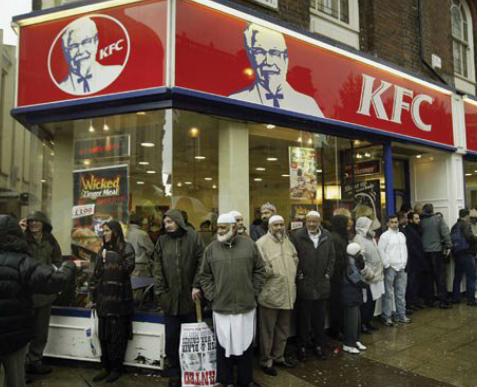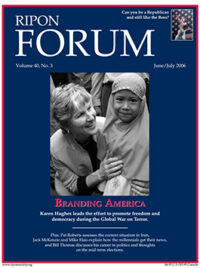It is too late to walk or talk softly. The big stick—the enormous military might of the U.S.—bears its own ominous message, but the U.S. might try to promote its democratic ideals with more skill, conviction, and volume. Even the British, our most loyal consumers and faithful allies, are losing the faith, despite their relative appreciation of American businesses along their high streets.

As an American living in Canterbury, I have listened to and read in the newspapers an almost unrelieved litany of despair and concern about U.S. global power and its mostly unilateral initiatives. Most British citizens have, moreover, precious little to say about either George Bush or Tony Blair that is not laced with invective. The U.S’s most reliable ally for its foreign policy, Britain, would seem to be a place where the animosity one expects to see in both France and Germany—never mind the Middle East—is somewhat less virulent.
Yet Secretary Rice’s visit earlier this spring to Jack Straw’s Western province in England suggests just how unhappy many Britons are regarding the Bush-Blair alliance and the war in Iraq. Protesters confronted Rice at nearly every turn of her trip and forced her to cancel a visit to a mosque. This anti-American stance is growing in Britain. Even as one can be generally sympathetic to U.S. foreign policy and believe that democratizing the Middle East is of world-historical importance, it is still important to understand the nature and consequence of dissent abroad. Although much of it is juvenile and ill-informed, there are forms of skepticism and hostility worthy of attention. The fortunes and misfortunes of Brand America comprise one such form.
Thomas Friedman called the felicitous synergy of Brand America and globalization “The Golden Arches Theory of Conflict Prevention.” The idea was that no two countries that had a McDonald’s in their major cities would wage war against each other. Friedman recently abandoned this convenient formulation in favor of “The Dell Theory,” which stipulates that “no two countries that are both part of a major global supply chain, like Dell’s, will ever fight a war against each other as long as they are both part of the same global supply chain.” In other words, the more the entire globe partakes in the economic prosperity hawked by Brand America — the more we all drink coffee from Starbucks while hammering away on our Dell notebooks — the more peaceful the planet will be. Western-style capitalism thus exercises a “soft power” that gives empire-building the good name it deserves.
The problem is that the current administration does not seem to be transmitting this message to friends and foes alike with much agility, clarity, and gusto. Early last year, President Bush appointed Karen Hughes as the Undersecretary of State for Public Diplomacy. When she announced this choice last March, Condoleezza Rice said, “We must do more to confront the hateful propaganda, dispel dangerous myths, and get out the truth.” In her remarks last February at the U.S.-Islamic World Forum, Hughes said: “I view my job as waging peace… America works and will continue to work with the many nations of the Islamic world in a spirit of partnership — we seek to be a partner for peace, a partner for progress, a partner for a better life for all our peoples.” To wage peace is to combine diplomacy and marketing as a way to re-Brand America. Hughes claims to be guided by “four strategic pillars” that she called “the four ‘E’s” — engagement, exchanges, education and empowerment. This is the rhetoric—not particularly compelling—of soft power. It finds more articulate expression in the “realistic Wilsonianism” and “democracy promotion” that Francis Fukuyama proposes in his recent book, After the Neocons: Where The Right Went Wrong.
One imagines that the message Secretary Rice wants to broadcast, or advertise, is the truth of freedom, democracy, and economic prosperity, a truth that the United States enacted as the Marshall Plan and successfully promoted during the Cold War. But much of the Arab world—and even significant elements of the British world—now see U.S. foreign policy in anything but favorable terms. To read The Guardian, England’s far-Left daily—is to see Bush as a mixture of Genghis Khan and Holy Crusader. To talk to many citizens in the U.K. is to confront tonic hostility to the Blair-Bush friendship and its consequences. In an attempt to improve his country’s image, Tony Blair has established a Public Diplomacy Strategy Board, an outgrowth of his earlier “Cool Britannia’’ campaign. The problem is that diplomatically and militarily, Great Britain is not too cool to rule, and continues to be jeopardized by its close association with U.S. interests.
As far as corporate concerns, Brand America seems to flourish in Britain. On the same high street in Canterbury where one sees plenty of American businesses (such as Subway, Pizza Hut, McDonald’s, Burger King, and The Gap, to name a few), one also sees card tables set up in front of the public library, staffed by anti-Bush advocates purveying “hateful propaganda” about the U.S. and displaying posters of Bush as “The World’s Greatest Terrorist.” Most tourists and townspeople stroll placidly by, either allergic or immune to these displays. But the very presence of these posters and protesters in the heart of the wealthiest county in England suggests something more than sensationalism. It is a growing rebellion not against the message or marketing of Brand America, but against its product.
Secretary Rice may have seen the protesters crossing her path, but she spoke to captive audiences. It is becoming harder and harder to sell American foreign policy to our strongest ally even as American businesses flourish along every high street in Great Britain. So far, business interests outstrip all other concerns, and most people glide by the posters and demagoguery to go shopping and have a coffee at Starbucks. We can rest assured that Canterbury and Seattle will never wage war on each other.
But the talk on and off the high street, all over Britain, suggests profound skepticism and disillusion about the way the U.S. wields its big stick. Perhaps that stick is so big it does not require any softer promotion. As Bush said, “I don’t do nuance.” But the President’s approval ratings at home—and his worsening reputation abroad—suggests that he might do well to have others—his image-makers and public diplomacy experts—advertise his policies, if not skillfully, at least more loudly.
Otherwise, American democratic ideals will degenerate into saber-rattling, saber-wielding, slogans, logos, and brand names, meaning it will be nothing more than a big stick.
James Soderholm is a free-lance writer and Professor at The King’s School of Canterbury.




